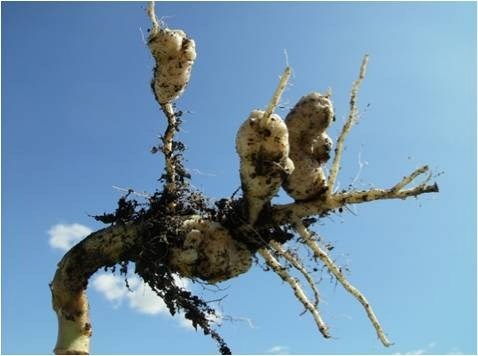Farmers in the MD of Bonnyville could have a big problem on their hands as clubroot, a serious soil-born disease, is spreading throughout the municipality.
Clubroot was found on a second farm in the MD of Bonnyville, specifically Township 60 Range 8, earlier this month confirming that the harmful disease is moving through the region.
“We did expect to find it this year because it was so close in the County of St. Paul. It is going to be spreading, that's why we're trying to get the word out to farmers in the area to take precautions,” said Matt Janz, director of agriculture for the MD of Bonnyville.
Prevalent in canola, clubroot can cause major headaches for producers if a crop contracts the disease as there is no way to completely get rid of disease and it will stay in the soil for approximately 20 years.
“If it is a serious enough infection (farmers) can have up to a 50 per cent yield loss in their canola field. It'll be a substantial money loss for the farmers if they have those losses in their canola field,” said Janz.
In an attempt to prevent the spread of clubroot throughout the MD, local agriculture officials have been holding a series of information sessions throughout the MD to provide producers with the information needed.
To prevent the spread of clubroot from coming into their field, producers are advised to make sure their equipment is cleaned thoroughly when going from one field to another. When it comes to seeding next year, farmers should be planning to use clubroot-resistant varieties of canola.
MD officials will be continuing to do inspections and encourage local farmers to do the same. If producers find sick plants in their canola crop they should be pulled. If they find galls on the roots Janz said the best step to take is to call the MD and they will help identify it and pay for the testing.
“It's not just a disease that you can look the other way and it'll go away. It'll be there forever so the best management is to identify it and put some precautions in place so you don't spread it to your other fields.”
The MD will be hosting another information session for canola producers this fall to provide more details about necessary precautions, cropping restrictions and to answer any questions farmers may have.
The MD of Bonnyille is also urging producers throughout the region to be on the lookout for poisonous Jimsonweed, also known as Devil's Trumpet, which has been spotted in the province.
“It's new to Alberta. The authorities are looking into it and believe it made it into Alberta via canola seed from the U.S.,” said Matt Janz, director of agriculture for the MD of Bonnyville.
While there have been no reports of the poisonous weed in the MD, the plant has been spotted in canola fields in central Alberta.
It is extremely dangerous and has caused death in humans and cattle that have ingested it.
Jimsonweed is easy to spot as it can stand up to five feet tall. The seed pod can be up to two inches, and has spikes surrounding it. The bloom of the Jimsonweed is purple and white and shaped like a trumpet.
“If you do see it, don't touch it with your bare hands,” said Janz, warning canola producers to be on the lookout when they are swathing their canola fields.
For more information about clubroot or Jimsonweed, or if you think you may have spotted either in your canola, contact the MD agriculture department at 780-826-3951.



